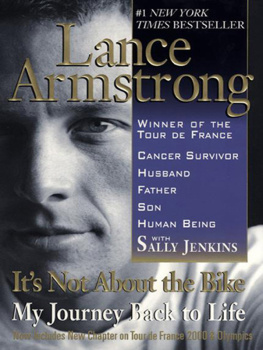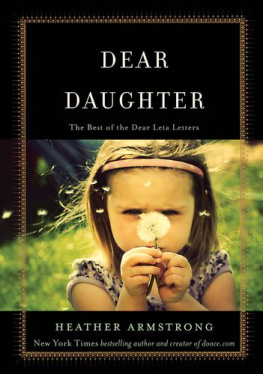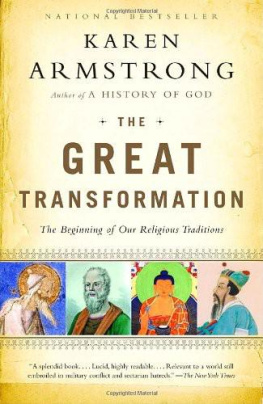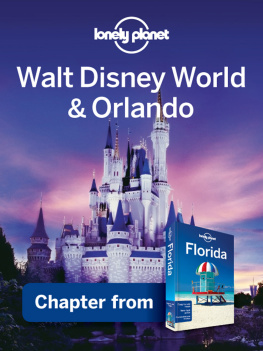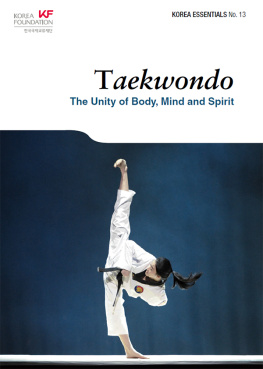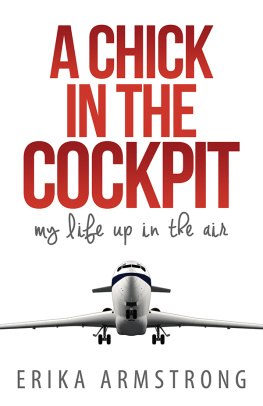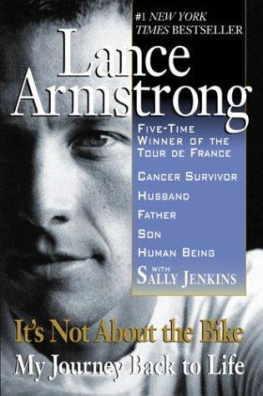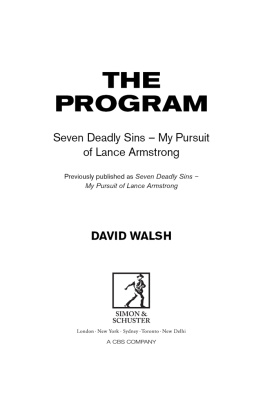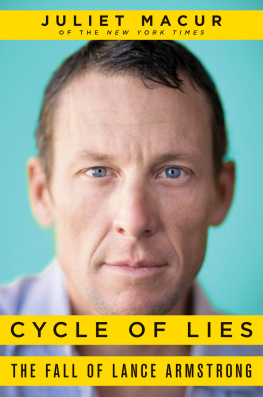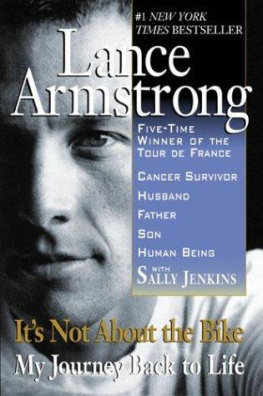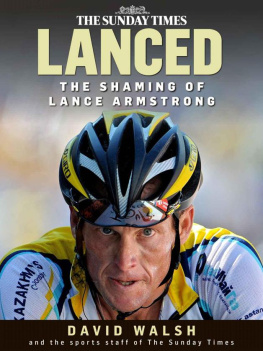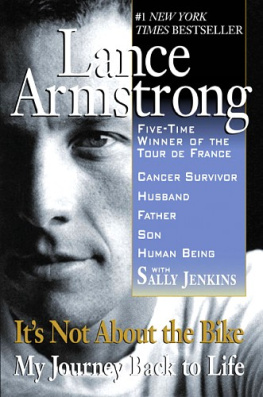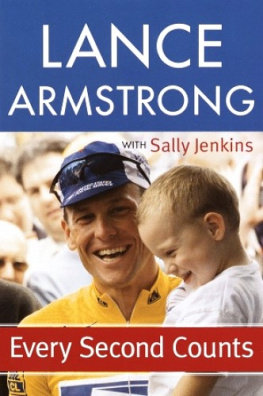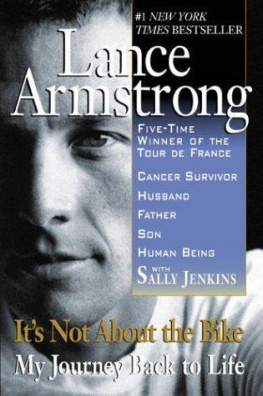G. P. Putnams Sons
Publishers Since 1838
a member of
Penguin Putnam Inc.
375 Hudson Street
New York, NY 10014
Copyright 2001 by Lance Armstrong
All rights reserved. This book, or parts thereof, may not be reproduced in any form without permission. Published simultaneously in Canada
Armstrong, Lance.
Its not about the bike : my journey back to life / Lance Armstrong with Sally Jenkins.
p. cm
ISBN 978-1-1012-0386-6
Making or distributing electronic copies of this book constitutes copyright infringement and could subject the infringer to criminal and civil liability.
Book design by Amanda Dewey
Frontispiece photo Thomas Boyd/The Register-Guard (Eugene, Oregon)
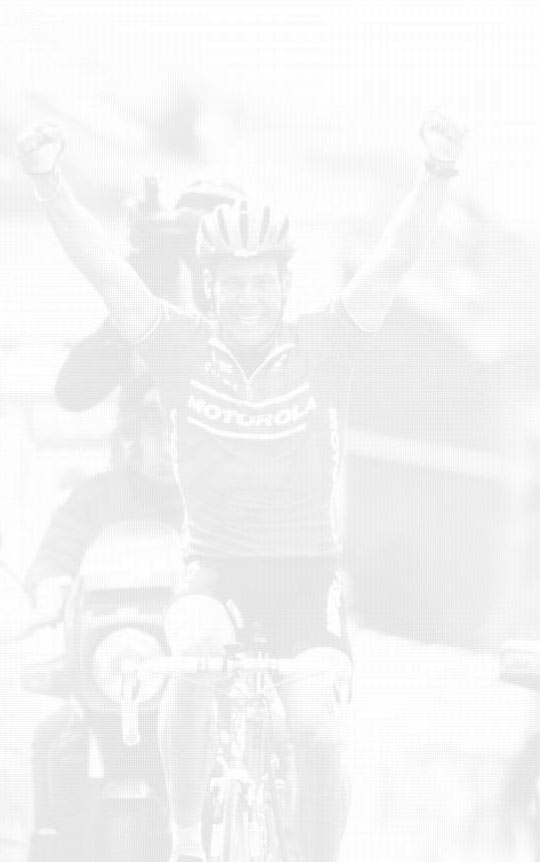
THIS BOOK IS FOR :
My mother, Linda, who showed me what a true champion is.
Kik, for completing me as a man.
Luke, the greatest gift of my life, who in a split second made the Tour de France seem very small.
All of my doctors and nurses.
Jim Ochowicz, for the fritters... every day.
My teammates, Kevin, Frankie, Tyler, George, and Christian.
Johan Bruyneel.
My sponsors.
Chris Carmichael.
Bill Stapleton for always being there.
Steve Wolff, my advocate.
Bart Knaggs, a mans man.
JT Neal, the toughest patient cancer has ever seen.
Kelly Davidson, a very special little lady.
Thom Weisel.
The Jeff Garvey family.
The entire staff of the Lance Armstrong Foundation.
The cities of Austin, Boone, Santa Barbara, and Nice.
Sally Jenkinswe met to write a book but you became a dear friend along the way.
The authors would like to thank Bill Stapleton of Capital Sports Ventures and Esther Newberg of ICM for sensing what a good match we would be and bringing us together on this book. Stacy Creamer of Putnam was a careful and caring editor and Stuart Calderwood provided valuable editorial advice and made everything right. Were grateful to ABC Sports for the comprehensive set of highlights, and to Stacey Rodrigues and David Mider for their assistance and research. Robin Rather and David Murray were generous and tuneful hosts in Austin. Thanks also to the editors of Womens Sports and Fitness magazine for the patience and backing, and to Jeff Garvey for the hitched plane ride.
one
B EFORE AND A FTER
I WANT TO DIE at a hundred years old with an American flag on my back and the star of Texas on my helmet, after screaming down an Alpine descent on a bicycle at 75 miles per hour. I want to cross one last finish line as my stud wife and my ten children applaud, and then I want to lie down in a field of those famous French sunflowers and gracefully expire, the perfect contradiction to my once-anticipated poignant early demise.
A slow death is not for me. I dont do anything slow, not even breathe. I do everything at a fast cadence: eat fast, sleep fast. It makes me crazy when my wife, Kristin, drives our car, because she brakes at all the yellow caution lights, while I squirm impatiently in the passenger seat.
Come on, dont be a skirt, I tell her.
Lance, she says, marry a man.
Ive spent my life racing my bike, from the back roads of Austin, Texas to the Champs-Elyses, and I always figured if I died an untimely death, it would be because some rancher in his Dodge 44 ran me headfirst into a ditch. Believe me, it could happen. Cyclists fight an ongoing war with guys in big trucks, and so many vehicles have hit me, so many times, in so many countries, Ive lost count. Ive learned how to take out my own stitches: all you need is a pair of fingernail clippers and a strong stomach.
If you saw my body underneath my racing jersey, youd know what Im talking about. Ive got marbled scars on both arms and discolored marks up and down my legs, which I keep clean-shaven. Maybe thats why trucks are always trying to run me over; they see my sissy-boy calves and decide not to brake. But cyclists have to shave, because when the gravel gets into your skin, its easier to clean and bandage if you have no hair.
One minute youre pedaling along a highway, and the next minute, boom, youre facedown in the dirt. A blast of hot air hits you, you taste the acrid, oily exhaust in the roof of your mouth, and all you can do is wave a fist at the disappearing taillights.
Cancer was like that. It was like being run off the road by a truck, and Ive got the scars to prove it. Theres a puckered wound in my upper chest just above my heart, which is where the catheter was implanted. A surgical line runs from the right side of my groin into my upper thigh, where they cut out my testicle. But the real prizes are two deep half-moons in my scalp, as if I was kicked twice in the head by a horse. Those are the leftovers from brain surgery.
When I was 25, I got testicular cancer and nearly died. I was given less than a 40 percent chance of surviving, and frankly, some of my doctors were just being kind when they gave me those odds. Death is not exactly cocktail-party conversation, I know, and neither is cancer, or brain surgery, or matters below the waist. But Im not here to make polite conversation. I want to tell the truth. Im sure youd like to hear about how Lance Armstrong became a Great American and an Inspiration To Us All, how he won the Tour de France, the 2,290-mile road race thats considered the single most grueling sporting event on the face of the earth. You want to hear about faith and mystery, and my miraculous comeback, and how I joined towering figures like Greg LeMond and Miguel Indurain in the record book. You want to hear about my lyrical climb through the Alps and my heroic conquering of the Pyrenees, and how it felt. But the Tour was the least of the story.
Some of it is not easy to tell or comfortable to hear. Im asking you now, at the outset, to put aside your ideas about heroes and miracles, because Im not storybook material. This is not Disneyland, or Hollywood. Ill give you an example: Ive read that I flew up the hills and mountains of France. But you dont fly up a hill. You struggle slowly and painfully up a hill, and maybe, if you work very hard, you get to the top ahead of everybody else.
Cancer is like that, too. Good, strong people get cancer, and they do all the right things to beat it, and they still die. That is the essential truth that you learn. People die. And after you learn it, all other matters seem irrelevant. They just seem small.
I dont know why Im still alive. I can only guess. I have a tough constitution, and my profession taught me how to compete against long odds and big obstacles. I like to train hard and I like to race hard. That helped, it was a good start, but it certainly wasnt the determining factor. I cant help feeling that my survival was more a matter of blind luck.
When I was 16, I was invited to undergo testing at a place in Dallas called the Cooper Clinic, a prestigious research lab and birthplace of the aerobic exercise revolution. A doctor there measured my VO2 max, which is a gauge of how much oxygen you can take in and use, and he says that my numbers are still the highest theyve ever come across. Also, I produced less lactic acid than most people. Lactic acid is the chemical your body generates when its winded and fatiguedits what makes your lungs burn and your legs ache.
Basically, I can endure more physical stress than most people can, and I dont get as tired while Im doing it. So I figure maybe that helped me live. I was luckyI was born with an above-average capacity for breathing. But even so, I was in a desperate, sick fog much of the time.
My illness was humbling and starkly revealing, and it forced me to survey my life with an unforgiving eye. There are some shameful episodes in it: instances of meanness, unfinished tasks, weakness, and regrets. I had to ask myself, If I live, who is it that I intend to be? I found that I had a lot of growing to do as a man.

